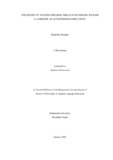
Please use this identifier to cite or link to this item:
https://hdl.handle.net/20.500.14301/494| Title: | Strategies of Teaching Speaking Skills in Secondary English Classroom: An Auto/ Ethnographic Study. |
| Authors: | Neupane, Kapil Raj |
| Citation: | Neupane, K.R. (2025).Strategies of teaching speaking skills in secondary english classroom: An auto/ethnographic study. |
| Issue Date: | Jan-2025 |
| Publisher: | Kathmandu University School of Education |
| School: | SOED |
| Department: | DOLE |
| Level: | M.Phil. |
| Program: | Master of Philosophy (MPhil) in English Language Education |
| Abstract: | This dissertation has explored my experience as a learner of 'English Language' in an under-resourced classroom setting and, later, my knowledge of teaching speaking through activities in English class. Being an auto/ethnographic researcher, I reflected upon my own as well as my participants' experiences of learning English and practices of teaching English with various activities to explore their practices. Through auto/ethnographic introspection of my socio-cultural and pedagogic context, I have tried to answer my question on how secondary level English teachers and I understand, develop and practice activity-based teaching speaking in the classroom. As the participants of this research, two Secondary English teachers of Bhaktapur and the researcher himself were purposively selected to explore the activities-based methods through data collection methods like observation, interview and field notes. Subsequently, after the transcription of the data, themes were taken out for further analysis and discussion. Along with the gradual transformation of the teachers from usual to activity based teaching, the study revealed that the learners benefited in a number of ways from activity-based language teaching. First of all, they could learn English, where there were significantly fewer lectures and more of their involvement physically and mentally. Moreover, activities provided them the platform to enjoy and learn through performance. They were exposed to various activities and creativity along with the learning of the language. The teachers tried to make their class as full of activities as possible. The outcomes of the study showed some of its significant implications for English teachers, school management, parents and English language teaching policy makers as a whole. Activity-based language was observed to have visible and productive results over the usual lecture method of language teaching. It seems to be a learner-centered participatory pedagogy. |
| URI: | https://hdl.handle.net/20.500.14301/494 |
| Appears in Collections: | Dissertation |
Files in This Item:
| File | Description | Size | Format | |
|---|---|---|---|---|
| Kapil Neupane_strategies of teachi 2025 5.pdf | 1.41 MB | Adobe PDF |  View/Open |
Items in DSpace are protected by copyright, with all rights reserved, unless otherwise indicated.